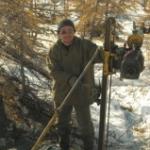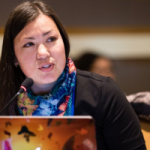Frozen Commons: Change, Resilience and Sustainability in the Arctic
Navigating the New Arctic (NNA) is one of NSF's 10 Big Ideas. NNA projects address convergence scientific challenges in the rapidly changing Arctic. This Arctic research is needed to inform the economy, security and resilience of the Nation, the larger region and the globe. NNA empowers new research partnerships from local to international scales, diversifies the next generation of Arctic researchers, enhances efforts in formal and informal education, and integrates the co-production of knowledge where appropriate. This award fulfills part of that aim by addressing interactions among social systems, the natural environment, and the built environment in the following NNA focus areas: Arctic Residents, Data and Observation, Education, Forecasting, and Resilient Infrastructure.
This project applies convergent methodologies to study the Arctic Frozen Commons (FC), defined as the ice, snow, and permafrost landscapes collectively used and governed by communities and numerous non-local stakeholders. While significant knowledge exists around biophysical characteristics of the cryosphere, this remains largely separate from its cultural and social understandings among local and Indigenous communities, culminating in poor integration around the use and governance of Frozen Commons in a rapidly changing Arctic. An enhanced understanding of interacting processes in the social, cultural, technological, environmental, and governance domains for frozen commons is critical to framing sustainable Arctic futures. This project advances transdisciplinary research by converging Arts, Science, Local and Indigenous Knowledge systems (ArtSLInK) for developing a deeper understanding of FC resilience and sustainability. ArtSLInK encompasses synchronous, equitable, co-productive engagement across the social and natural sciences, the arts and place-based local and Indigenous knowledge systems, each with their distinct modes of exploration and expression.
This project integrates social, technological, and environmental domains of frozen commons, and explicitly engages with governance implications across diverse worldviews and management narratives. The project addresses three research questions: 1) What FC are recognized by culturally diverse Indigenous and local communities and regional stakeholders, 2) How are they governed within specific cultural domains?, and 3) What are the major sociocultural, environmental, technological, and infrastructural driving forces and their interrelations that affect the resilience and sustainability of FC? The project pursues the following objectives: (1) to identify and inventory community relevant FC; (2) to situate knowledge of FC using a social-ecological-technological systems (SETS) framework; (3) to understand interactions between sociocultural, environmental, and technology infrastructure domains affecting the availability, quality, and use of FC; and (4) to use integrated modeling approaches to determine sources of resilience and sustainability for FC under changing conditions. The project applies a transdisciplinary and comparative research framework for two rural-urban community pairs in Russia and the U.S. (Alaska) that are representative of different community sizes, governance regimes, socioeconomic arrangements, and geographies.












